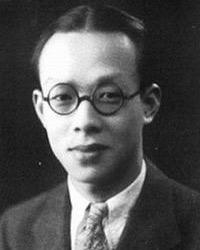- Joined
- Sep 30, 2008
- Messages
- 4,638
- Points
- 113
Zhu ni shengri kuaile! Father of Pinyin turns 110 years old, celebrates with a strawberry-topped cake

Meet Zhou Youguang, he just turned 110 years old on January 13th. In his younger days, he created the Pinyin system that is used to teach the Chinese language today.
According to his publisher, Zhou celebrated the big 110 (or 111 by his counting) with his niece, nephew in law, nurse, a pink princess hat and a sizeable cake topped off with some strawberries. Personally, he didn't care much about his own birthday saying "it is of no importance at all," but to all scholars, linguists and Chinese language learners across the world, it should be a pretty big deal.
Nicknamed the "father of Pinyin", Zhou was born into a wealthy aristocratic family in 1906 near the last years of the Qing dynasty. He then went on to study in elite universities in both Shanghai and Japan.
In 1955, Zhou was assigned to co-chair a committee aimed to increase Chinese literacy. His creation of Pinyin, a system using the Roman alphabet to romanize Chinese pronunciation, has been credited with helping increase literacy rates in China from 20 percent to 90 percent.

Later in life, Zhou became an outspoken supporter for the democratization of China and as a result much of his written work has been censored by the Chinese government.
By Kitty Lai
[h/t Tom Hancock]
Contact the author of this article or email [email protected] with further questions, comments or tips.
By Shanghaiist in News on Jan 15, 2016 5:00 PM

Meet Zhou Youguang, he just turned 110 years old on January 13th. In his younger days, he created the Pinyin system that is used to teach the Chinese language today.
According to his publisher, Zhou celebrated the big 110 (or 111 by his counting) with his niece, nephew in law, nurse, a pink princess hat and a sizeable cake topped off with some strawberries. Personally, he didn't care much about his own birthday saying "it is of no importance at all," but to all scholars, linguists and Chinese language learners across the world, it should be a pretty big deal.
Nicknamed the "father of Pinyin", Zhou was born into a wealthy aristocratic family in 1906 near the last years of the Qing dynasty. He then went on to study in elite universities in both Shanghai and Japan.
In 1955, Zhou was assigned to co-chair a committee aimed to increase Chinese literacy. His creation of Pinyin, a system using the Roman alphabet to romanize Chinese pronunciation, has been credited with helping increase literacy rates in China from 20 percent to 90 percent.

Later in life, Zhou became an outspoken supporter for the democratization of China and as a result much of his written work has been censored by the Chinese government.
By Kitty Lai
[h/t Tom Hancock]
Contact the author of this article or email [email protected] with further questions, comments or tips.
By Shanghaiist in News on Jan 15, 2016 5:00 PM




